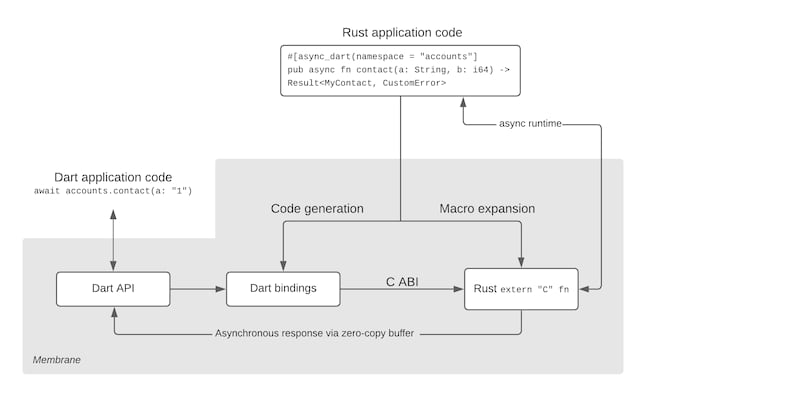20 releases (8 breaking)
| 0.11.0 | Sep 15, 2023 |
|---|---|
| 0.9.6 | Jul 21, 2023 |
| 0.6.3 | May 20, 2022 |
| 0.6.2 | Mar 25, 2022 |
| 0.3.3 | Nov 17, 2021 |
#64 in FFI
90,912 downloads per month
115KB
3K
SLoC
Membrane

Development Environment
- Rust
- Dart
- libclang (for generating bindings)
- Linux
apt-get install libclang-dev
- MacOS
brew install llvm
- Linux
On Linux ffigen looks for libclang at /usr/lib/llvm-11/lib/libclang.so so you may need to symlink to the version specific library: ln -s /usr/lib/llvm-11/lib/libclang.so.1 /usr/lib/llvm-11/lib/libclang.so.
Usage
View the example directory for a runnable example.
In your crate's lib.rs add a RUNTIME static that will survive for the lifetime of the program. RUNTIME must hold an instance of membrane::App<Runtime> where Runtime has the membrane::Interface trait implemented for whichever async framework you wish to use. In our examples we use tokio to provide the runtime behavior, you are welcome to copy it:
use membrane::runtime::{App, Interface, AbortHandle};
pub struct Runtime(tokio::runtime::Runtime);
impl Interface for Runtime {
fn spawn<F>(&self, future: F) -> AbortHandle
where
F: std::future::Future + Send + 'static,
F::Output: Send + 'static,
{
let handle = self.0.spawn(future);
AbortHandle {
abort: Box::new(move || handle.abort()),
}
}
fn spawn_blocking<F, R>(&self, future: F) -> AbortHandle
where
F: FnOnce() -> R + Send + 'static,
R: Send + 'static,
{
let handle = self.0.spawn_blocking(future);
AbortHandle {
abort: Box::new(move || handle.abort()),
}
}
}
static RUNTIME: App<Runtime> = App::new(|| {
Runtime(
tokio::runtime::Builder::new_multi_thread()
.worker_threads(2)
.thread_name("libexample")
.build()
.unwrap()
)
});
Then write some code that is annotated with the #[async_dart] macro. No need to use C types here, just use Rust String, i64, f64, bool, structs, or enums as usual (or with Option). The functions can be anywhere in your program and may return either an async Result<T, E> or an impl Stream<Item = Result<T, E>>:
use membrane::async_dart;
use tokio_stream::Stream;
use crate::data;
#[async_dart(namespace = "accounts")]
pub fn contacts() -> impl Stream<Item = Result<data::Contact, data::Error>> {
futures::stream::iter(vec![Ok(Default::default())])
}
#[async_dart(namespace = "accounts")]
pub async fn contact(id: String) -> Result<data::Contact, data::Error> {
Ok(data::Contact {
id: id.parse().unwrap(),
..Default::default()
})
}
And now you are ready to generate the Dart package. Note that this code goes in a bin/generator.rs or similar to be ran with cargo run or a build task rather than in build.rs (which only runs before compilation):
fn main() {
// if nothing else in this generator.rs references lib.rs then
// at least call a dummy function so lib.rs doesn't get optimized away
example::load();
let mut project = membrane::Membrane::new();
project
// name the output pub directory
.package_destination_dir("../dart_example")
// the pub package name, if different than the directory
.package_name("example")
// give the basename of the .so or .dylib that your Rust program provides
.using_lib("libexample")
// use Dart enums instead of class enums
.with_c_style_enums(true)
.create_pub_package()
.write_api()
.write_c_headers()
.write_bindings();
}
If everything went as planned you can now call Rust from Dart with:
cd example
cargo run
cargo build
cd ../dart_example
cp ../example/target/debug/libexample.dylib .
dart --enable-asserts run
(--enable-asserts enables a pretty print toString() in the generated classes)
import 'package:dart_example/accounts.dart';
void main(List<String> arguments) async {
var accounts = AccountsApi();
print(await accounts.contact(id: "1"));
}
If you get an error on Linux about not being able to load libexample.so then add the pub package's path to LD_LIBRARY_PATH.
Dependencies
~7–14MB
~174K SLoC